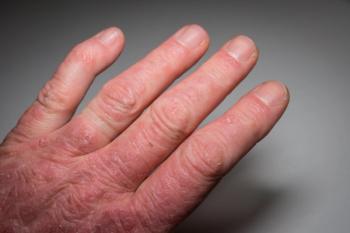
Analyzing trends from online conversations among patients with myasthenia gravis (MG), researchers found that issues with current treatments were mentioned in nearly 24% of conversations.

Analyzing trends from online conversations among patients with myasthenia gravis (MG), researchers found that issues with current treatments were mentioned in nearly 24% of conversations.

Most recently, the FDA’s Oncologic Drugs Advisory Committee unanimously voted to recommend ciltacabtagene autoleucel (Carvykti; Johnson & Johnson) in patients who have received at least 1 line of treatment for relapsed/refractory multiple myeloma (RRMM).

Researchers found that in vitro clot formulation and fibrinolysis assays were able to determine the hemostatic effects of different replacement agents, as well as identify distinct pharmacodynamic responses across the different mechanisms of action.

A recent study found a minor link between prolactin levels and the risk of developing estrogen receptor (ER)-positive or ER-negative breast cancers. However, there was no association found between the use of selective serotonin reuptake inhibitors (SSRIs) and breast cancer risk.

FDA granted accelerated approval to trastuzumab deruxtecan-nxki for adult patients with unresectable or metastatic HER2-positive solid tumors who received prior systemic treatment and have no satisfactory alternative treatment options.

"The government really didn't rise to the challenge the way that it should have,” notes Ben Jones, vice president of government relations and public policy for The US Oncology Network. “Practices were in distress…stretching all resources to figure out workarounds."

Idecabtagene vicleucel (ide-cel) was able to triple progression-free survival and reduce the risk of disease progression or death in a phase 3 trial.

Kathy Oubre, MS, CEO of Pontchartrain Cancer Center, is 1 of 6 cochairs for the 2024 Community Oncology Conference, and here she discusses how meeting content has incorporated ongoing coverage of the extremely disruptive cyberattack and how there is still so much work to be done.

Patients with hidradenitis suppurativa (HS) in Canada often wait long periods of time to receive an HS diagnosis and receive evidence-based therapy, highlighting the need for increased interdisciplinary education on HS management.

A new study found that tumor sites in stage I-III colorectal cancer (CRC) could affect recurrence-free survival and survival after recurrence in patients.

Researchers developed a web server that can help predict therapeutic responses to combination lenvatinib and immune checkpoint inhibitors in patients with unresectable hepatocellular carcinoma (HCC).

Patients with systemic lupus erythematosus (SLE) and atrial fibrillation (AF) exhibited elevated risks of severe cardiac complications, alongside increased in-hospital mortality, costs, and length of stay (LOS).

A retrospective study analyzing tissue assays from patients with cutaneous melanoma demonstrated the promise of yes-associated protein (YAP) as a predictive biomarker for melanoma prognosis.

CMS finalizes policies to enhance consumer protections, promote competition, and expand access to care for Medicare Advantage (MA) and Medicare Part D; digital therapeutic Rejoyn receives FDA clearance for adults with major depressive disorder (MDD); study reveals minimal symptom reduction from nirmatrelvir–ritonavir (Paxlovid) in high-risk, fully vaccinated patients.

Jonathan E. Levitt, Esq, founding partner of boutique health care law firm Frier Levitt, LLC, discusses a recent class-action lawsuit brought against Johnson & Johnson in which an employee alleged a breach of fiduciary duty regarding her employer-sponsored pharmacy benefits.

Findings from this new study demonstrate the safety and efficacy of rIX-FP among a group of treatment-naive patients often characterized by young age and particular risk for severe bleeding.

Coverage of our peer-reviewed research and news reporting in the health care and mainstream press.

Initiatives to address physician burnout should be prioritized in a post-pandemic world, with physician shortages affecting the country.

Most fragility fractures experienced by people with chronic lymphocytic leukemia (CLL) are vertebral, the study found.

Judy Alberto, MHA, RPh, BCOP, director of clinical initiatives at the Community Oncology Alliance (COA), addresses the challenges pharmacies face in managing formularies to provide optimal patient care.

Patients included in the analysis had psoriatic arthritis and had either not been treated with biologic disease-modifying antirheumatic drugs or had an inadequate response or an intolerance to tumor necrosis factor inhibitors.

President Joe Biden and Senator Bernie Sanders continue their push to cut the cost of asthma inhalers and prescription drugs in the US.

The subretinal drusenoid deposit form of age-related macular degeneration (AMD) was found to be associated with valvular heart disease as well as cardiac index.

The newest treatment approved for amyotrophic lateral sclerosis (ALS) will be withdrawn from the market due to negative clinical trial results; former President Trump’s surgeon general is advocating for conservative states to support needle exchanges; new US hepatitis C infections dropped slightly in 2022 after more than a decade of steady increases.

To deliver on the promise of value-based care, organizations need to return to the fundamental objective: to deliver high-quality, affordable care to our communities.

This study builds on previous evidence for lenalidomide-induced selective advantage for TP53-mutant clones.

Corticosteroids are the most common treatment for pediatric patients with alopecia areata (AA), but promising newer options like JAK inhibitors are emerging. This review highlights the importance of personalized treatment plans and maximizing response through combination therapies.

Similar burdens were observed among both children with a diagnosis of type 1 diabetes (T1D) and their informal caregivers, both at the time of diagnosis and when the disease was already established.

Investigators reported the regimen had a tolerable safety profile, though they said its use may be limited due to the development of newer therapies.

A cluster analysis demonstrated the potential for the Multiple Sleep Latency Test (MSLT) to aid in the diagnosis of central hypersomnia and distinguish between idiopathic hypersomnia subgroups.

259 Prospect Plains Rd, Bldg H
Cranbury, NJ 08512
© 2025 MJH Life Sciences®
All rights reserved.
